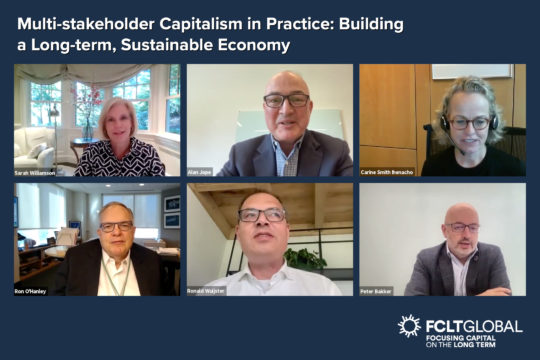On 11 and 18 January, FCLTGlobal brought together global CEOs representing investors and companies to discuss multi-stakeholder capitalism and how stakeholder strategies are being integrated into long-term decision making.
On 11 and 18 January, FCLTGlobal brought together global CEOs representing investors and companies to discuss multi-stakeholder capitalism and how stakeholder strategies are being integrated into long-term decision making.
Participants identified several key issues across the investment value chain that need attention for a multi-stakeholder approach to be put into practice:
Because we had two sessions, one with a primarily North American group and one with a broader global group, there were a few key points of differentiation between the two roundtables. In particular,
FCLTGlobal is very engaged with our membership on the issue of multi-stakeholder in practice and recognizes the need for further research on incorporating externalities into decision-making.
Earlier today, we published our empirical research collaboration with the University of Pennsylvania Wharton ESG Analytics Lab, which finds correlation of positive financial performance and corporations that perform best on stakeholder interest metrics (the “walk”) and proper communication to stakeholders (the “talk”). Read the full report here.
Our forthcoming toolkit is designed to help leaders identify and operationalize stakeholder interests. It will be released publicly in parallel with our biennial FCLTSummit on March 2, 2022.
We would particularly like to thank all of those who contributed to these conversations for their insights.
| Conversation Starters |
|---|
| John Graham, CEO, CPP Investments |
| Adena Friedman, President & CEO, Nasdaq |
| Chow-Kiat Lim, Chief Executive Officer, GIC Private Limited |
| David Neal, Chief Executive, IFM Investors |
| Participants | ||
|---|---|---|
| Daniel Adamson, Senior Managing Director, Wafra, Inc. | Meshal Alothman, Director General, The Public Institution for Social Security (PIFSS) | Nick Ashmore, Director, ISIF, Ireland Strategic Investment Fund |
| Ariel Babcock, Managing Director, Head of Research, FCLTGlobal | Vlad Barbalat, President and Chief Investment Officer, Liberty Mutual Insurance Company | Greg Case, Chief Executive Officer, Aon plc |
| Laura Chappell, CEO, Brunel Pension Partnership Ltd | Song Hwee Chia, President, Joint Head of Investment Group and Portfolio Management Group, Temasek | John Connaughton, Co-Managing Partner, Bain Capital Inc. |
| Stephen Dainton, Deputy Global Head of Markets, Barclays | Carmine Di Sibio, Chairman and CEO, EY | Lars Dijkstra, Chief Sustainability Officer, Kempen Capital Management |
| Stuart Dunbar, Partner, Baillie Gifford | Jim Fitterling, Chief Executive Officer, Dow | Carol Geremia, President, MFS Investment Management |
| Greg Heckman, CEO, Bunge Limited | Bobby Le Blanc, President of Onex and Head of Onex Partners, Onex Corp | Rebecca Lewis, Partner, Arisaig Partners |
| Mark Machin, Former President & CEO CPP Investments, Director Serendipity Capital | Geraldine Matchett, Co-CEO & Managing Board Member, Royal DSM | Clarke Murphy, Chief Executive Officer, Russell Reynolds Associates |
| Saker Nusseibeh, CEO, Federated Hermes | Franz Paasche, Senior Vice President, Chief Corporate Affairs Officer, PayPal, Inc. | Dilhan Pillay Sandrasegara, CEO, Temasek |
| Sonya Sawtell-Rickson, Chief Investment Officer, HESTA | Robert Smith, Founder, Chairman and Chief Executive Officer, Vista Equity Partners Management, LLC | Kevin Sneader, Co-President of Asia Pacific Ex-Japan, The Goldman Sachs Group, Inc. |
| Carsten Stendevad, Co-Chief Investment Officer for Sustainability, Bridgewater Associates | Bob Sternfels, Global Managing Partner, McKinsey & Company | Jo Taylor, President and CEO, Ontario Teachers' Pension Plan |
| Howard Ungerleider, President & Chief Financial Officer, Dow | George Walker, Chairman & CEO, Neuberger Berman | Mark Weinberger, Former Global CEO and Chairman, EY |
| Matt Whineray, CEO, New Zealand Super Fund | Theresa Whitmarsh, President, Independent Board Member | Sarah Keohane Williamson, CEO, FCLTGlobal |
| Mark Wiseman, President, Alberta Investment Management Corporation | Ronald Wuijster, Executive Board member APG Group - CEO APG AM, APG Asset Management |

Stakeholder Capitalism | Article
7 July 2021 - Many businesses have operated from a shareholder primacy playbook when cultivating long-term financial strategies. However, recent events are inspiring a shift across the investment value chain.

Video
21 September 2021 - While many organizations recognize the importance of considering constituencies such as workers, suppliers, customers, society and the environment in business and investment decision-making, implementation of new practices and behaviors has been inconsistent, and their effectiveness has been hard to measure.

Stakeholder Capitalism | Report
17 January 2022 - What does it take to earn a return from implementing a multi-stakeholder strategy and offer a rebuttal to skeptics? To answer this question, we turned toward empirical analysis, comparing the characteristics and performance of companies pursuing various stakeholder-oriented strategies.